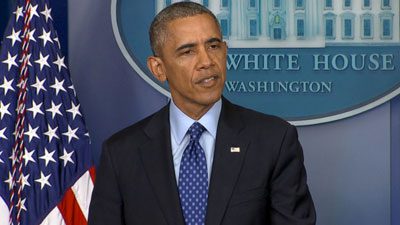
BAGHDAD — President Obama said Thursday, June 19, he is planning to send up to 300 military advisers to Iraq to help retrain Iraqi security forces as they battle an insurgent invasion.
“Armed forces will not be returning to combat in Iraq,” Obama said in a White House announcement.
After a meeting with national security advisers, Obama also announced a series of steps designed to improve intelligence, surveillance and reconnaissance of the insurgent army that has taken several Iraqi cities and is threatening the capital in Baghdad.
While some allies have called for removal of Prime Minister Nouri al-Maliki, Obama told reporters that “it’s not our job to choose Iraq’s leaders.”
In addition to military advisers, Obama said he is planning to create “joint operation centers” with the Iraqi military to help coordinate plans and designate possible targets among the insurgents.
Iraqi government forces battled rebels for control of the country’s biggest refinery on Thursday as Prime Minister Nuri al-Maliki waited for a U.S. response to an appeal for air strikes to beat back the threat to Baghdad.
The sprawling Baiji refinery, 200 km (130 miles) north of the capital near Tikrit, was a battlefield as government troops held off insurgents from the Islamic State of Iraq and al-Sham and its allies who had stormed the perimeter a day earlier, threatening national energy supplies.
A government spokesman said around noon that its forces were in “complete control” but a witness in Baiji said fighting was continuing and ISIS militants were still present.
A day after the government publicly appealed for U.S. air power, there were indications Washington is sceptical of whether that would be effective, given the risk of civilian deaths that could further enrage Iraq’s once dominant Sunni minority.
Turkish Prime Minister Tayyip Erdogan said the United States “does not view such attacks positively,” given the risk to civilians. A Saudi source said that Western powers agreed with Riyadh, the main Sunni state in the region, that what was needed was political change, not outside intervention, to heal sectarian division that has widened under Maliki.
Video aired by Al-Arabiya television showed smoke billowing from the plant and the black flag used by ISIS flying from a building. Workers who had been inside the complex, which spreads for miles close to the Tigris river, said Sunni militants seemed to hold most of the compound in early morning and that security forces were concentrated around the refinery’s control room.
The 250-300 remaining staff were evacuated early on Thursday, one of those workers said by telephone. Military helicopters had attacked militant positions overnight, he added.
On Tuesday, staff shut down the plant, which makes much of the fuel Iraqis in the north need for both transport and generating electricity.
ISIS advance has only been slowed by a regrouped military, Shi’a militias and other volunteers. But on Tuesday, Sunni fighters took the small town of Mutasim, south of Samarra, giving them the prospect of encircling the city which houses a major Shi’a shrine. A local police source said security forces withdrew without a fight when dozens of vehicles carrying insurgents converged on Mutasim from three directions.
ISIS, whose leader broke with al-Qaeda after accusing the global jihadist movement of being too cautious, has now secured cities and territory in Iraq and Syria, in effect putting it well on the path to establishing its own well-armed enclave that Western countries fear could become a centre for terrorism.
Some politicians have urged Obama to insist that Maliki goes as a condition for further U.S. help. Asked about U.S. aid for the prime minister, Secretary of State John Kerry said: “What the United States is doing is about Iraq, it’s not about Maliki. Nothing the president decides to do is going to be focused specifically on Prime Minister Maliki. It is focused on the people of Iraq.”
He played down the extent of possible U.S. cooperation with Iran, which backs Maliki, saying Washington wanted communication on Iraq with its long-time enemy to avoid “mistakes” but would not work closely with Tehran.
U.S. officials, speaking on condition of anonymity, say Iraq has asked for drone strikes and increased surveillance by U.S. drones, which have been flying over Iraq.






Leave a Reply